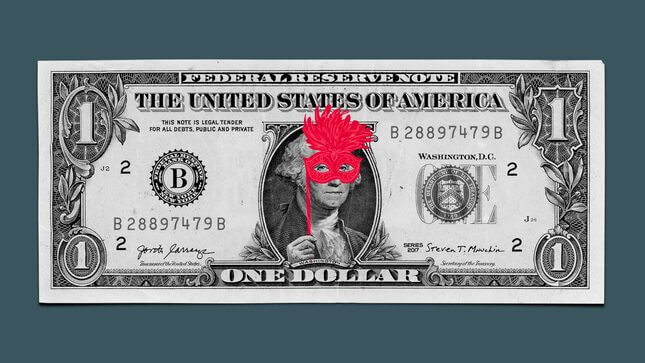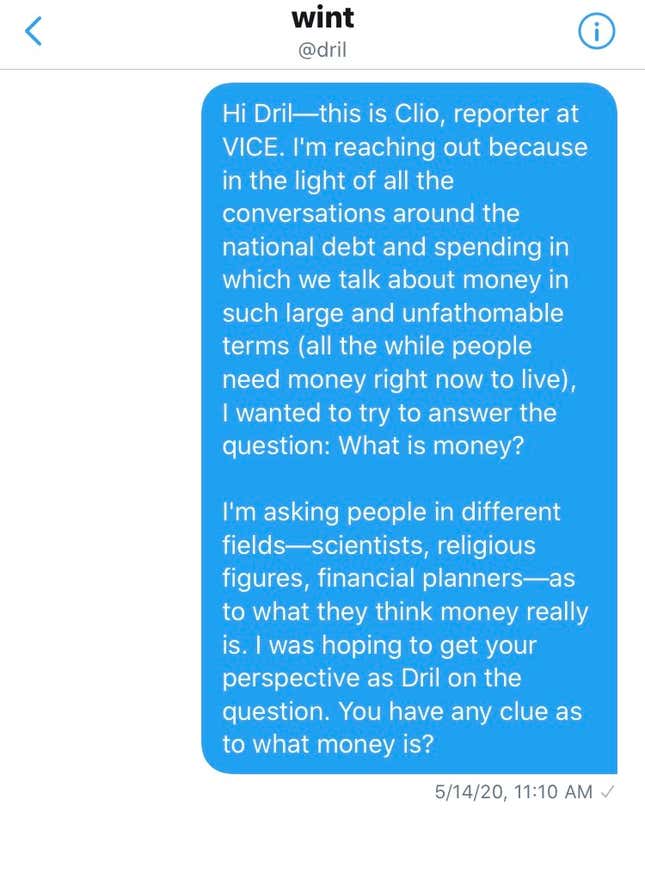What Is Money?
Latest
Image: Jim Cooke
Money—what is it? It’s 75 percent cotton and 25 percent linen, according to the Treasury Department’s Bureau of Engraving and Printing website, whose official URL is moneyfactory.gov. If you’re in America, it’s green. In other countries it can be a different color, maybe even a different shape.
People often exchange money, made at the government’s money factory, for the goods and services they need to live. Cardi B’s hit song about money, “Money,” has perhaps one of the best explanations of how money works: “Shake a little ass / You get a little bag and take it to the store.”
But sometimes, money doesn’t come in a little bag that you take to the store. Sometimes, people put huge sums of “money” into investments and portfolios. Some of those people, like Jeff Bezos, are worth $138 billion, a number that makes no sense. As The New Republic’s Katie McDonough put it, wealth like Bezos’s is a “horizon—a money infinity—not a place.” Sometimes this money looks like a shiny tech company losing billions a year while being heralded as titans of their industries. Take WeWork’s infamously overinflated valuation. The company’s co-working competitor IWG, as Sam Adler-Bell noted for Jewish Currents, was “worth 15 times less than WeWork at its peak valuation, earns double the revenue, and turns a profit.” Another senseless number.
When it comes to the federal government’s budget, the idea of what money is becomes even more unfathomable. Politicians are already trotting out the spectre of the national deficit to put an end to coronavirus aid. “We’ve added about $3 trillion to the national debt,” Senate Majority Leader Mitch McConnell told reporters. (None of this seemed to be an issue when Republicans passed a $1.5 trillion tax cut for the wealthy just a few years ago.)
Harping about the “debt” is an argument that politicians from both sides of the aisle use, but it’s an even more strange one during a pandemic. If it’s not worth spending money to literally save peoples’ lives, then what’s even the point? Keeping money is stupid. Money is only useful when you get rid of it. Groceries, medicine, housing, maybe some fancy cheeses—these are the things that are worth something. Money is but the grubby paper that we throw away to get them.
But that’s just one amateur woman’s opinion. Working people have always dealt with money—and more specifically its scarcity—in concrete terms, but money in its largest, and most abstract forms is what controls our systems. To try to figure out what, exactly, money is in this time of crisis, I reached out to experts in different fields—a theologist, a venture capitalist, Suze Orman, an anthropologist—to see what they thought. Here’s what these people said when I asked them a simple question: What is money?
Suze Orman, financial adviser:
Money is the physical manifestation of who you are.
Willie Jennings, theologist at Yale Divinity School:
I think money is a tool for building community. Money symbolizes a deeper social contract. Money is to be used to help people live, that’s the fundamental reality of money. The problem with so many ways of thinking about this is that it turns money into an object for veneration. Money in and of itself becomes the point. Saving it, having it, hoarding it becomes the point. In fact, money symbolizes a social relationship that is to be enhanced and strengthened. What does that mean? It means that money is for the sake of building life. The horror happens when people’s lives are made in service to money. So the problem is, once people imagine that their lives have to be shaped in order to sustain the flow of money, we’ve got the thing backwards. The purpose of money is to sustain life.
-

-

-

-

-

-

-

-

-

-

-

-

-

-

-

-

-

-

-

-

-

-

-

-

-

-

-

-

-

-

-

-

-

-

-

-

-

-

-

-









































